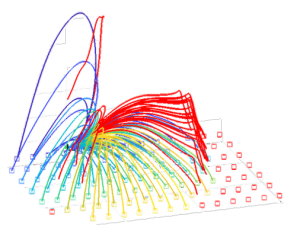(Huntsville, Ala. | January 14, 2020) – CFD Research Corporation announced today the award of a Small Business Innovative Research (SBIR) Phase II contract from the U.S. Air Force Research Lab (AFRL) to further develop a design optimization framework based on multi-objective evolutionary algorithms, surrogate models, and hardware acceleration for optimization and design of multi-disciplinary autonomous munition systems.
“The increased availability and reduced costs of computational resources in combination with mature modeling and simulation capabilities have led to valuable guided weapon performance evaluation tools,” said Andrew Kaminsky, CFD Research Principal Investigator. “However, the current design optimization approaches typically utilize these tools in a brute-force approach which requires significant time, computing resources, and prior experience from subject matter experts.”
Recently, there has been a strong push to develop evolutionary algorithms (EA) for complex multi-disciplinary engineering systems to enable fully autonomous and intelligent design. Despite their great potential, utilization of evolutionary algorithms in the design of munition systems remains scarce due to the complexity of the multiple interactive subsystems and because EA are nature-inspired, gradient-free optimization algorithms, they require a huge number of model evaluations and simulations to search the design landscape for the optimal solution. To address this challenge, CFD Research has developed a novel and computationally efficient platform of evolutionary algorithms for automated design of munition systems.

Guided weapon evaluated for gridded target set
In prior work, CFD Research successfully demonstrated a modular optimization framework encapsulating key technology elements, including a high-fidelity guided weapon simulator, multi-objective evolutionary algorithms (MEA), surrogate-assisted optimization, and GPU computing. This proof-of-concept was applied to USAF relevant case studies and showed that the new paradigm enables unprecedented computational efficiency and superior designs of guided weapon systems.
In this follow-on project, CFD Research will enhance the framework to improve performance and functionality. Guided weapon modeling will be extended using USAF simulators to capture design complexity and fidelity. Models will be improved to accommodate broad and deep design space in practical munition systems with evolving targets. A scalable software design along with easy-to-use user interface and run-time visualization will exploit hardware advancements on heterogeneous CPU-GPU computing platforms. The technology will be extensively validated and demonstrated using case studies of USAF interest, and integrated with USAF designated guided munition design environment.
“The proposed design optimization capability will be of value in military and civilian sectors. The tool will serve as a technology backbone specifically meeting the needs of USAF for use in multi-disciplinary munition system design,” said Dr. Kapil Pant, CFD Research executive vice president. Among non-DoD applications, the proposed software can find wide use in various engineering sectors, including: aviation, navigation, power, combustion, propulsion, automobile, chemical, biomedical and pharmaceutical industries, among others.
About CFD Research: Since its inception in 1987, CFD Research has worked with government agencies, businesses and academia to provide innovative solutions within the Aerospace & Defense, Biomedical & Life Sciences, and Energy & Materials industries. Over the years CFD Research has earned multiple national awards for successful application and commercialization of innovative component/system technology prototypes, multi-physics simulation software, multi-disciplinary analyses, and expert support services. CFD Research is an ISO9001 and AS9100 registered company and is appraised at CMMI Level II for services. Learn more at www.cfdrc.com.






